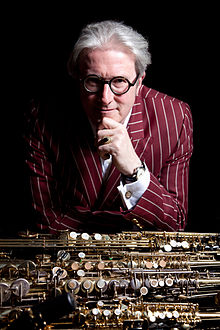John Harle
John Harle | |
|---|---|
 Harle in 2001 | |
| Background information | |
| Born | 20 September 1956 |
| Origin | Newcastle upon Tyne, England |
| Genres | Classical, hybrid |
| Occupation | Musician |
| Instrument | Saxophone |
| Years active | 1973–present |
| Labels | Universal, EMI Classics, Deca, Argo, Unicorn-Kanchana, Hannibal, Sospiro |
John Harle (born 20 September 1956, Newcastle upon Tyne, England) is an English saxophonist, composer, educator and record producer.[1] He is an Ivor Novello Award winner and has been the recipient of two Royal Television Society awards.
Biography
Following his education at the Royal College of Music in London and in Paris with Daniel Deffayet as a French Government Music Scolar, he won the Amcon Award of The American Concert Artists Guild. He was a member of the band of composer Michael Nyman, expanding from there into scoring for film and television. In the 1990s, he began a career as solo saxophonist and also began composing, both artistically and commercially.
In addition to his own prolific recording, Harle has contributed directly or indirectly to a number of charting songs and albums by others.[2] A jingle he wrote for Nissan in 1993 became the basis of a charting pop single by Jazzie B. He contributed to the charting albums Terror and Magnificence (1996) by Elvis Costello and Sarah Leonard, and Standing Stone (1997) by Paul McCartney.
Harle has also been an educator, serving at the Guildhall School of Music and Drama in London in the late 1980s as a professor of Saxophone and Chamber Music.[2] He is currently Visiting Professor of Saxophone at the Guildhall School.
He composed the theme tune for the BBC TV series Silent Witness[3] and in May 1998 was the castaway on BBC Radio 4's long-running Desert Island Discs programme, with the BBC describing him as "the most-recorded saxophonist in the world".[4]
In 2012 the Royal Television Society awarded Harle its 'Music: Original Score' award for his composition for BBC 2's programme Lucien Freud – Painted Life, describing it as "An excellent, challenging and original score that perfectly complements Freud's powerful imagery".[5] It also won the 2013 British Academy of Songwriters, Composers and Authors (BASCA) Ivor Novello Award for 'Best Television Soundtrack'.[6]
In October 2013 Harle talked on BBC Radio 3's In Tune programme about his recently-released album Art Music, the composition of which was inspired by his favourite paintings.[7]
Harle appeared with Marc Almond on the BBC's Front Row radio programme in February 2014 to discuss their collaborative work about Gothic London, The Tyburn Tree (Dark London).[8] Harle was a guest on the same programme in November of that year, to mark the bicentenary of the birth of Adolphe Sax by assessing the contribution of Sax's invention, the saxophone.[9]
Harle has two sons named Matthew and Dan.[1]
Discography
- Habanera (1987)
- The Shadow of the Duke (1992)
- Sax Drive (1995)
- Terror & Magnificence (1997)
- Art Music (2013)
- The Tyburn Tree (Dark London) (2014)
References
- ^ a b Gilbert, Jenny (2 March 1996). "Fantastic read". The Independent. Retrieved 27 March 2015.
- ^ a b Lewis, Uncle Dave. "Artist Biography". Allmusic. Retrieved 3 May 2015.
- ^ "John Harle & Marc Almond: The Tyburn Tree featuring Iain Sinclair and Sarah Leonard, 2 March 2014 - 19:30 Hall: Biogs". Barbican Centre. Retrieved 13 January 2016.
- ^ "Desert Island Discs: John Harle". BBC Online. Retrieved 12 January 2016.
- ^ "RTS Announces Winners For Craft & Design Awards 2011/2012". Royal Television Society. Retrieved 12 January 2016.
- ^ "2013 Winners". http://theivors.com/. Retrieved 13 January 2016.
{{cite web}}: External link in|website= - ^ "Matthew Barley, Brook Street Band, John Harle". BBC Online. Retrieved 12 January 2016.
- ^ "Marc Almond and John Harle; Willy Russell on Liverpool's Everyman Theatre; Gary Shteyngart". BBC Online. Retrieved 12 January 2016.
- ^ "Interstellar, Nick Hornby, John Harle, Bob Dylan's Basement Tapes". BBC Online. Retrieved 12 January 2016.
